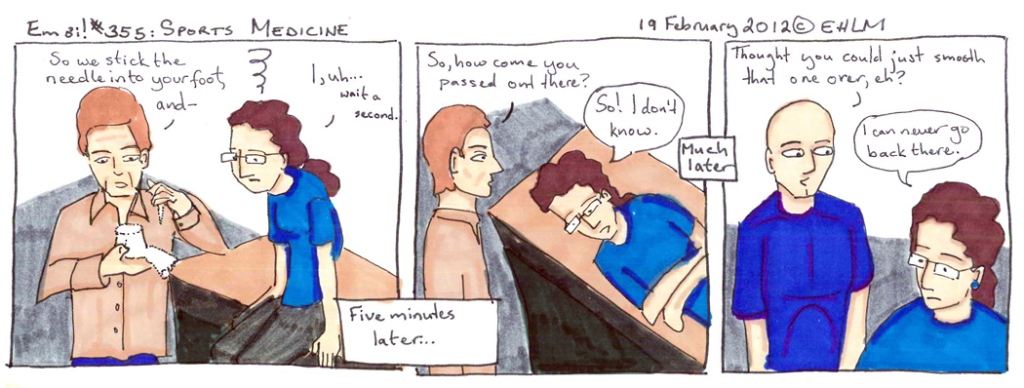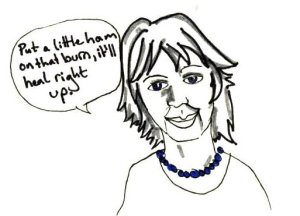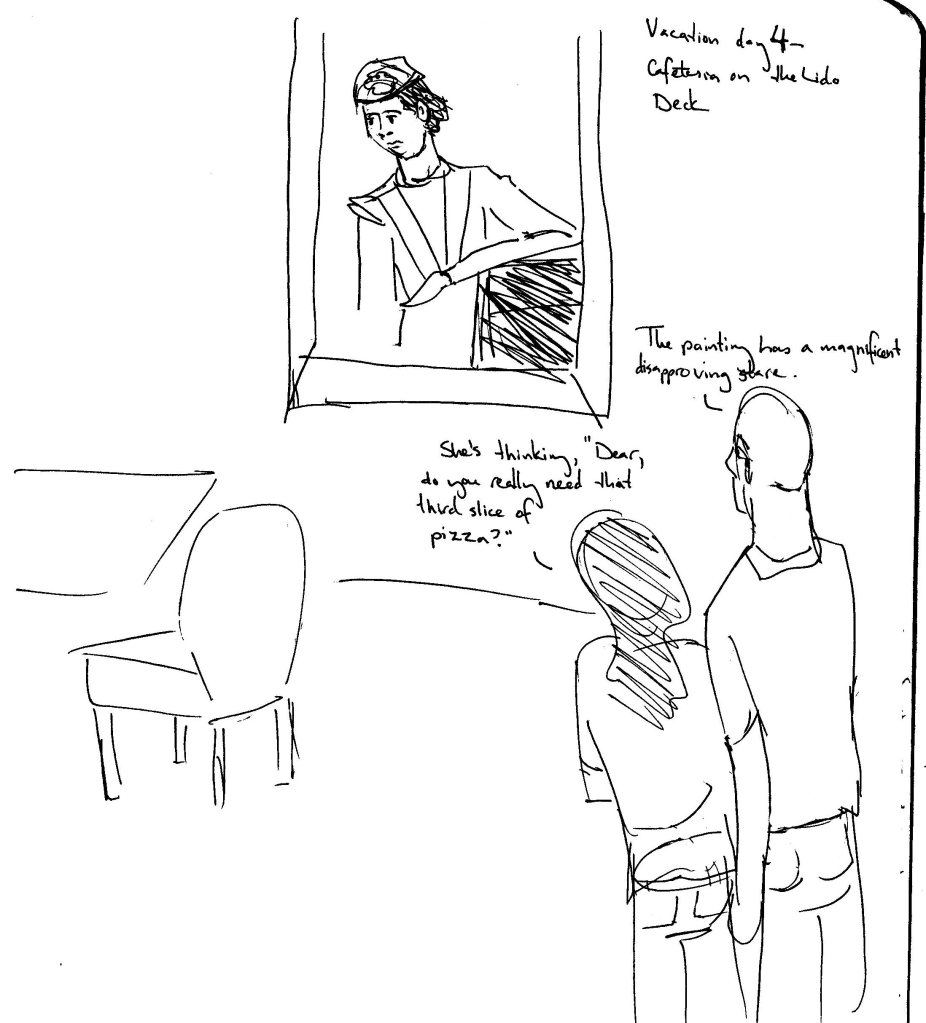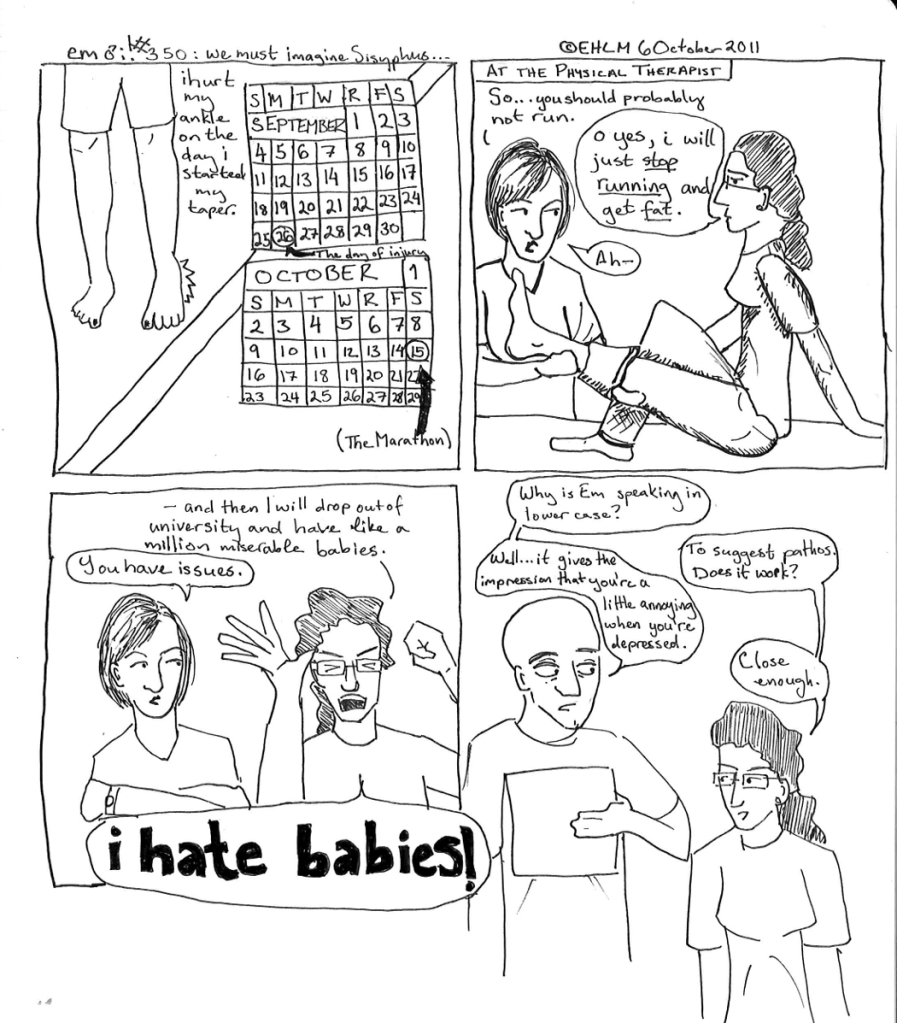Whether you are a Democrat or a Republican, I think we can all agree that last night’s gubernatorial recall here in Wisconsin was a total travesty and a terrible insult to all women, LGBT persons, union workers, and all thinking persons more generally.
Have I missed anyone?
B and I have long joked, with minimal seriousness, that if candidate x (initially John McCain, but Walker in the most recent election and Romney in the upcoming presidential one) were to win, we would head for country n (Canada, Sweden, or France, take your pick). When hearing of this plan, a relative quipped, “You’d leave us all to suffer, and not try to help defeat candidate x?” To which we’d replay, “Well, no,” because typically in the US these candidates have a lot of money and power, while we have (comparatively) little, so what the hell can we do, anyway?
But that got me thinking–what is the obligation of a citizen when her government has ceased to represent her interests? (And I do feel, for a variety of reasons, that the government of Wisconsin and the Republican party more generally are not governing with my best interests–which are to say the interests of a woman academic–in mind, and that given the opportunity they would prefer for me to drop out of the workforce entirely and stay home and have babies.)

John Locke says that if you don’t like it, you can lump it: “But since the government has a direct jurisdiction only over the land, and reaches the possessor of it, (before he has actually incorporated himself in the society) only as he dwells upon, and enjoys that; the obligation any one is under, by virtue of such enjoyment, to submit to the government, begins and ends with the enjoyment; so that whenever the owner, who has given nothing but such a tacit consent to the government, will, by donation, sale, or otherwise, quit the said possession, he is at liberty to go and incorporate himself into any other commonwealth; or to agree with others to begin a new one, in vacuis locis, in any part of the world, they can find free and unpossessed: whereas he, that has once, by actual agreement, and any express declaration, given his consent to be of any commonwealth, is perpetually and indispensably obliged to be, and remain unalterably a subject to it, and can never be again in the liberty of the state of nature; unless, by any calamity, the government he was under comes to be dissolved; or else by some public act cuts him off from being any longer a member of it” (Locke, section 121, italics in original, bolding mine).
Of course, Locke also says later that if legislators act “against the trust reposed in them,” then the people living in that society are within their rights to change the government: “[R]evolutions happen not upon every little mismanagement in public affairs. Great mistakes in the ruling part, many wrong and inconvenient laws, and all the slips of human frailty, will be born by the people without mutiny or murmur. But if a long train of abuses, prevarications and artifices, all tending the same way, make the design visible to the people, and they cannot but feel what they lie under, and see whither they are going; it is not to be wondered, that they should then rouze [i.e., rouse] themselves, and endeavour to put the rule into such hands which may secure to them the ends for which government was at first errected…” (Locke, sections 222-225, italics in original, bolding mine).
To what issue will this come? It seems inconclusive. The addition in the first quote of the parenthetical notation “before he has actually incorporated himself in the society” and the phrase “tacit consent to the government” make me worry that Locke was in fact referring to a situation such as: You are living in the middle of an ungoverned place (i.e. in the state of nature). Suddenly some people come along and start up a government. You didn’t ask for the government, therefore you’re allowed to leave. Which seems okay in theory, but go tell that to the American Indians and see how hard they laugh.
The first quote, even taken at face value, raises a larger problem of privilege. We could probably afford to sell our house and move to Canada. I think we have a sufficient amount in savings to get green cards and B has a job that he can do in Canada, which would also be a big plus for immigration officials. Also, I speak French, the result of a long and expensive education that allowed me time to focus on relatively useless things (like learning multiple foreign languages) instead of getting a job. There are a lot of Americans who don’t meet any of these qualifications; in fact, a lot of people have underwater mortgages and can’t afford to sell their houses at all, let alone have the necessary savings to immigrate to a different country. If all liberal, upper middle class Americans start migrating to other countries, America is left with the poor (both Dems and Repubs) and the Wealthy Republicans who, let’s face it, don’t really have economic incentive to make the country a great place for the working class. So in the same way that we have a responsibility to fight for rights because we might need them “someday” (e.g., healthcare, abortions) or because people we know might need them (e.g., gay marriage and associated rights), we could say that there is a responsibility among those who otherwise might leave to stay and provide a balance to those who would choose to exploit those who cannot leave.
I’m uneasy with this responsibility idea. It smacks of “white man’s burden”-type bullshit–surely the people who remain in the US after this purported exodus can look after themselves! And yet citizens have a responsibility to vote, don’t they? To voice their opinions at least when society requires the selection of a new government. So perhaps I’d restate this a different way: to abandon the US would require not just becoming an expat but a naturalized citizen of another country, since to retain the advantages of US citizenship while living abroad would enable one to shirk the responsibility one has of being an active participant in society, essentially the responsibility (at minimum) to vote and protect both one’s own rights and the rights one believes others deserve.
The second quote is suggestive of the conclusion that one should not quit the country; since rebellion (or call it simply changing the status quo) is permissible when one feels the government is no longer working, and there is some inherent responsibility citizens have to take part in society, it is better to stay and fight than to flee.
[I wish to add belatedly, footnotedly, that Locke’s use of terms like “the people” suggests that he sees all individuals in a society as agreeing on what the correct course of action is, in opposition to their government. In the absence of unison, which is certainly the case in WI presently, I suspect he would accede to the majority’s opinion and tell me, as a member of the minority, that I cannot go about instituting rebellions just because I feel slighted. However there is always something to be said for being the loyal opposition, because when the majority is making choices that are (morally, ethically) incorrect or unsound (as arguably they are), someone needs to speak up for the oppressed–see, for example, the abolition movement before the Civil War.]
My other favorite political theorist, the late, great Robert Nozick, does say, when speaking about a replacement for society that would be, essentially, small communities of individuals under minimal government, that, “After a person has spent much of his life in a community, sent down roots, made friends, and contributed to the community, the choice to pick up and leave is a difficult one. Such a community’s…seriously changing its character, will affect its individual members in something like the way in which a nation’s changing its laws will affect its citizens” (Nozick, 324, italics his) and that “Anyone may start any sort of new community…they wish. For no one need enter it. Modifying an already existing community is held to be a different matter” (ibid.). His suggestions–that people who disagree with a proposed change should be compensated in some way, e.g. (this is very particular to the libertarian project he is working on)–are impracticable in US society as it stands, but he does seem to argue strongly for the “if you don’t like it, you can lump it” point of view.
Nozick’s work on communities does suggest one other solution: flight need not be international. If one’s state has changed politically, one is welcome to move to a state more in line with one’s views. There are fifty of them, plus several protectorates/colonies; surely one will match one’s views. This is a slightly less privileged action (though it still requires some liquidity of funds that not everyone has at hand) and allows residents of a divided country to assort themselves in ways that please them.
But after all of this reasoning, I still feel conflicted. There are reasons beyond the political to stay in Wisconsin, and reasons beyond the political to go. Ultimately, I think Nozick is right when he writes that the goal of a society is to allow its members to “individually or with whom we choose, to choose our life and to realize our ends and our conception of ourselves, insofar as we can, aided by the voluntary cooperation of other individuals possessing the same dignity” (334). Wherever I go, or if I remain, if I can do that, I’ll be satisfied.
Bibliography
Locke, John. Second Treatise of Government. Edited by C. B. Macpherson. Indianapolis, IN: Hackett Publishing Co., 1980. (The unedited text is online here.)
Nozick, Robert. Anarchy, State, and Utopia. [United States]: Basic Books, 1974. (A previewable version is available at Google Books here.)

















